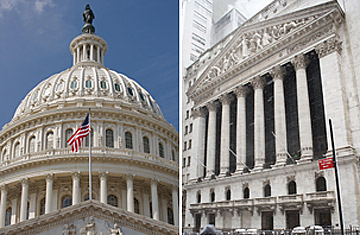
(2 of 2)
On the other hand, watering down reform to cut a deal with the GOP could alienate a liberal base that already felt neglected after the public option was stripped out of health reform. And the health care experience showed Democrats that the horse-trading necessary to corral 60 Senators can end up producing cornhusker kickbacks that make reform unpopular.
Meanwhile, the default position for the GOP in the Obama era is no, and while its united recalcitrance failed (barely!) to stop health care, that's likely to make its leaders even less eager to hand the President another big victory. For reasons of anti-regulatory ideology as well as intense pressure from banks and other business lobbies, many Republicans — and some conservative Democrats — are deeply uncomfortable with a financial crackdown in the first place. Senator Bob Corker has been the GOP's leading voice for compromise, even criticizing his own party's intransigence, but he also told me many provisions in the House bill were "crazy left," and said Obama's proposal for a modest tax on big banks reminded him of Venezuela. Really, it's hard to imagine many Republicans saying yes unless they thought they'd get hammered for saying no.
That leads to the most important reason for skepticism: financial reform is so complex and confusing, with so many moving parts, that excuses to say no will be exceedingly easy to find. Even a group of staunch like-minded reformers would have a hard time finding common ground; in fact, that's exactly what happened inside the Obama Administration, which is why the President recently proposed new add-on provisions limiting bank size and speculation. So how hard is it going to be for the less staunch to find something in the bill to reject? It's worth noting that the 100%-confident Gregg and Democratic Senator Jack Reed were assigned to hash out compromise rules for derivatives — and failed. Even if they had succeeded, the House might not have gone along. And there are dozens of similar issues that need to be resolved for reform to pass.
Most of the spotlight on reform has focused on the up-or-down question of an independent consumer agency, a fairly simple issue even for nonexperts. But reasonable reformers can and do disagree about how much power to give the Federal Reserve, how to wind down failing banks without bailouts, how to regulate "systemic risk," whether to cap the size of banks, whether to allow banks to own hedge funds or play the markets with their own cash, whether to preempt stricter state banking regulations, and countless other disputes over leverage and liquidity restrictions, payday lenders, securitization, industrial loan corporations, derivatives end users, mortgage underwriting and other arcane issues that probably won't translate into 30-second attack ads.
The point is that reform won't pass unless every one of those issues gets resolved in the Senate, and then re-resolved to get through the House and Senate again. It could happen. But don't be surprised if in a few months you see Gregg shaking his head sadly: If only the Democrats weren't so intransigent about proprietary trading, or 15-1 leverage restrictions or something else you've never thought about, we could've had a deal. And don't be surprised if the Beltway consensus then concludes that failure was inevitable.
